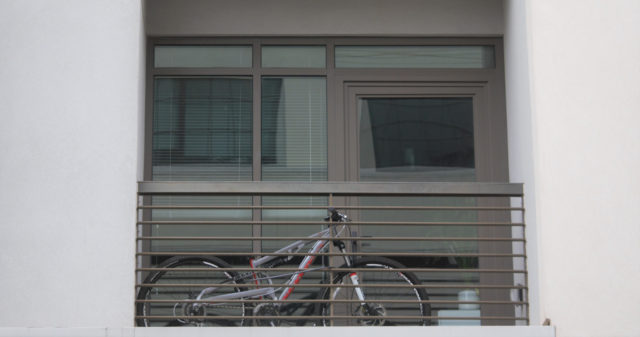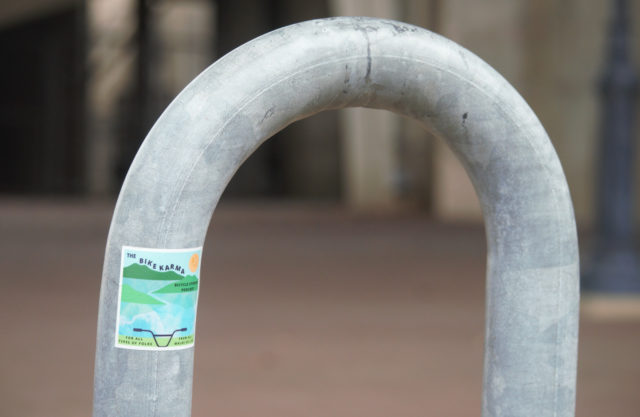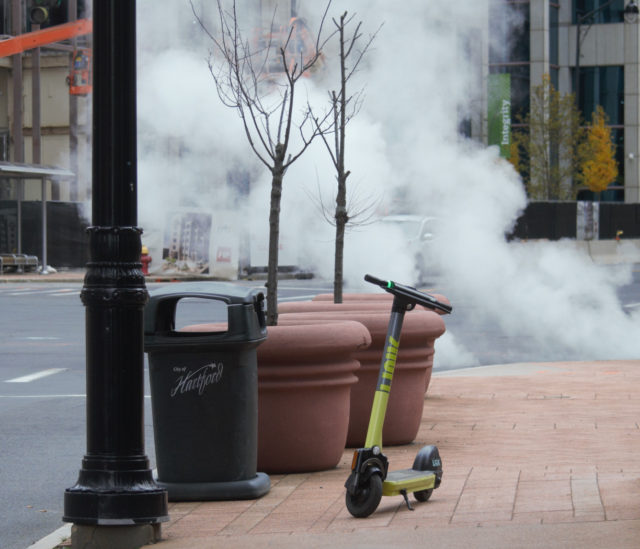As far as individual actions go, ditching the car is the second most impactful thing you can do to reduce your carbon footprint. Many people say they want to do it, but then don’t. This series will provide guidance and answer questions so that those who want to do meaningful work in healing the planet can begin living their values through choosing to be car-free or car-lite.
This series was designed for people already thinking seriously about ditching (or putting in time out) their cars, and it was entirely a philosophical choice to show the “doing” before providing the reasons for why.
And in that same spirit, you know what, maybe it’s best that you stay in your giant metal cage. We don’t need any more converts! Think of all the traditions you’d be giving up: endlessly circling a block to find parking, dressing inappropriately for the season because you’re always inside a climate controlled box, and what would you even talk about at the water cooler without the quintessential American experience of being perpetually stuck in traffic? You’d be sacrificing an aspect of your identity, the part that marks you based on the type of car you drive. If you aren’t a Subaru man, who even are you?
Wait, you’re still interested? Well, there are other drawbacks to opting out of the car, and you should hear about them since this is a big decision.
Once you see how terrible engineering has made an entirely car-centric landscape, you can’t unsee it. You’ll be stripped of illusions. You will rage.
Why have our neighborhoods been designed and redesigned to make it dangerous for all of us to get where we need to go? Why do people double-down on this by driving their Suburban Assault Vehicles a handful of blocks? Why are construction signs dumped on sidewalks and in bike lanes when the notices are for drivers? Why anything?!
Windshield bias is everywhere. Why are driving and parking directions expected, but event planners almost never mention public transportation or location of bike racks? Why is the company party planned at a spot that is not served by buses after 6 PM?
How can going car-free seem appetizing if this is what’s in store?
Another drawback? You will be asked to educate and advocate constantly. There’s that assumption employers (and others) are known to make about a person’s promptness and mobility based on mode of transportation. You will be quizzed by strangers about how you plan to get somewhere, when it’s none of their business.
And then there’s the trend of making everything drive-thru. (Nothing except for movies should be drive-in and I will fight you on that) Remember at the beginning of the pandemic when some covid testing stations were drive-thru only and some of us were yelling at the top of our lungs that not everybody owns a car and that using an Uber when experiencing Covid symptoms is wildly irresponsible? And, you know what happened? They began to make accommodations for pedestrians. It’s still infuriating that it needed to be said at all, nevermind the idiocy of creating situations of long idling cars during an outbreak that impacts the respiratory system.
Then there were the free food distribution events during the pandemic – massive, car-only occasions. Pedestrians and cyclists were actually forbidden from participating, and it brought to mind the whole avocado toast argument – the one where someone lobbed the accusation that the reason people can’t afford homes is because they’re buying avocado toast, and during all this, some of us were flailing our arms and pointing to the cars. How much money was burned up driving to, idling, and then driving back from these food banks? How much money was burned on car payments, car insurance, car tax, and all the rest?
Nevermind that time a friend was told by a chain pharmacy employee that she could not ride her bicycle in their drive-thru because this was dangerous. They could’ve asked the sources of danger – drivers – to GTFO, or they could’ve designed safer drive-thru lanes, but instead they picked the vulnerable user to bump. Big mistake. She complained and later got an apology along with permission to use their drive-thru when on her bicycle. Most people either don’t know that just about any policy and practice can be negotiated, or they don’t have the time and energy to do it.
If you give up your car, prepare to be exhausted, and not because cycling or walking requires much physical energy.

Not intimidated yet?
Do you enjoy blending in? Well, if you give up your car you will also lose social status. There are snobs – on the political right and left – who see public transit, cycling, and walking as something only the poor do. Oh, they usually won’t come right out and say it, but you’re smart enough to know what is implied. At times, instead of just asking them what their damage is, I’ll play dumb:
“Do you feel comfortable on the bus?”
“I mean, the seats aren’t movie theater seats, but I guess…? I’m not usually on it for more than 15 or 20 minutes. It’s fine.”
“Oh. What about the environment, other passengers?”
“You mean people? Do I feel comfortable around people?”
“Yes”
“It’s not like a plane. I’m not trapped in a middle seat until Omaha. I can get off on the next block.”
They’ll gush about the high speed trains they took while on a fancy European vacation, while refusing to hop on the 62 and sit among the great unwashed for 10 minutes, even though it means not having to deal with parking in West Hartford Center at the end of the trip.
And, okay, there was one time another passenger was muttering “murder” repeatedly for the whole stretch of Wethersfield Avenue, but he got off the bus without doing a murder, and to be fair, I’ve probably sung “undead, undead, undead” in public and not realized it, freaking out somebody. Most trips are not noteworthy and most passengers are doing nothing interesting. Regardless, if you ditch your car, you will be associated with folks who talk murder on the bus you’ll begin to sense that acquaintances are wondering why you aren’t spending 50% of your income on a private vehicle instead. It is also to your benefit to see a person’s true colors. Now I know who the gross snobs are, and they won’t be coming to my house to play.
(By the way, I will soon be launching the Car-Free Diaries – a weekly highlight reel of my walking, cycling, bus riding, and other car-free adventures commutes. I thought some people might need to know that people do this in New England all year long.)

The biggest drawback, though, is becoming a vulnerable road user whose safety needs are rarely taken into account and who is accused of making a fuss when explaining why a truck parked in a bike lane is a problem. You will have near misses — if you are lucky — almost daily, and then the pleasure of hearing acquaintances bemoan how they see pedestrians wearing dark clothing at night or how one time a cyclist ran a stop sign and the driver was inconvenienced into tapping the brake pedal. You’ll be looked at like you have three heads when you suggest people clear the sidewalks of snow, promptly. It’s hard to not take it personally when immersed in a system designed to not keep you alive. Take it personally. Use that rage. Vulnerable Road User, or Unstoppable Whirlwind of Fury? You decide.

You’re still reading, which I think means you are weighing your options and remaining open to possibility.
Some of us like it just fine over here, even if we stand out.
Besides the financial savings and ability to dramatically reduce one’s carbon emissions, the top benefit of being car-free is the freedom. Yes, freedom.
There are spontaneous social opportunities. So many dogs to pet! Catching up with friends and neighbors! Meeting comedians on the bus!
Being car-free means that even those who do not think things like “I should exercise” will have a degree of exercise automatically built into our day. Those daily steps? Achieved by walking to and from work. Getting sunlight, even in autumn and winter when others have quit the idea of going outdoors, is a matter of going to work. Nothing special.
You develop more connection to nature by being immersed in it, and even in an urban environment where nature has been tragically manipulated, there are little joys that remain. There’s awareness of what the seasons mean, and knowing that you can still find raspberries outside in December. You will have a better appreciation of Wallace Stevens if your walking or cycling commute takes you beneath hundreds of birds during crow season.
Not being in a cage means having the capacity to really get to know where you live and who else lives there. You don’t have to fret, as some do, about stranger danger when you have a realistic sense of what the world is like. You develop the ability to distinguish between comfort and safety, between quirky and dangerous.
There are a few other benefits to living without a car. Moving objects mostly through your own strength regulates purchases, unless you’re very strong or willing to be at a store every single day. Every object has weight. You find yourself choosing between wine and babka, and that’s probably how it should be.
For those who are impatient and bad at planning, being car-free is a daily meditative practice in patience and planning.
Finally, being car-free means losing a huge source of stress. You are not always trying to find parking or remembering where you parked. You aren’t worrying about if someone slammed into your parked car or your moving car with you inside it. Not worrying about someone stealing your car. You skip over the news articles about carjackings because this is irrelevant information. Not worrying about what that clunk clunk errrrr sound is and how much that will cost to fix, if it’s even fixable. You can go out and have a few drinks and know that you won’t be getting behind the wheel of a car, so you won’t need to make that decision about how much is too much. Don’t have to worry about falling asleep at the wheel. There are plenty of other places in life to demonstrate that you are a responsible human being — you don’t need to prove it through car ownership.
Okay, readers — what did I miss? For those already car-free or car-lite, what have been other benefits you’ve experienced? Let us know.


Jim Head
Some of the unexpected benefits for me:
– I get free parking and a free battery charge whenever I commute to work.
– I get cheered on by my kids during my workouts (something they rarely did on the jogging stroller). “Go faster, Daddy, the ice cream is meltinggg!!!” is a core summer memory now.
– in general, just more quality time with my kids. We plan Ebike adventures every weekend. There’s even singing involved.
– ebike aside, we have had weekend fasttrak adventures which everyone remembers fondly. Walking places, catching buses, seeing people, is all very wholesome and enjoyable.
Jane
<3
I’m sure you’ve already mentioned, but I love how much more connected to my neighborhood and city when I’m on foot. I nod to the people I pass, notice historical plaques I’ve somehow never seen before, the way light hits certain buildings.
I also love how much easier it is to spend my money locally. When I’m in a car I’m more likely to think about where it’ll be easier to pull in briefly on my way to somewhere else. On foot I pop in in much less time and put my money where my values are, no parking spot required. And I hate exercising for the sake of it so better when my errands are also my exercise.
Melissa
So true — the exercise part!. And the other points you make like “losing a huge source of stress.” I’ve been car free for decades. I never wanted my license and cars always made me feel so trapped. I’ve always preferred walking/fresh air and public transportation Great article and perspective!